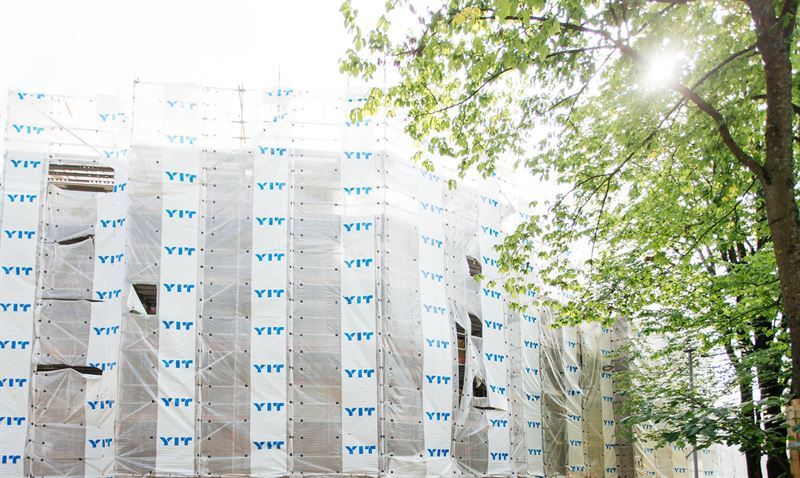Elanikud soovitavad: Päevalille 17 sai erakordselt kõrge hinnangu
- EE Articles
- Uudised
- 25.10.2019
- YIT Corporation
Jätkusuutlikkus on üks YIT uue äristrateegia alustaladest
YIT Corporation’i uudised, 25. oktoober 2019, 7.00.

Jätkusuutlikud elu- ja tegutsemisviisid on prioriteediks linnadele, mis soovivad endale seatud kliimaeesmärke täita, samuti on see oluline investorite ja tarbijate jaoks.
Soome riiklikus kavas on seatud eesmärk saavutada 2035. aastaks süsinikuneutraalsus ning 2040. aastaks loodetakse saavutada negatiivne süsinikuheide. Selleks, et Soome ühiskonnal õnnestuks need eesmärgid täita, peab ehitussektor samuti aktiivselt kliimaprobleemidega tegelema.
Eluasemete kasutamine ja nende ehitamine moodustab umbes poole kogu maailma looduslike ressursside kasutamisest ning umbes 40% kogu energiatarbimisest. Kolmandik kõikidest kasvuhoonegaasidest tekivad ehitiste kasutamise ja ehitamise tagajärjel. Ehitussektoril on kliimale tohutu suur mõju, kuid seni ei ole sellest väga palju räägitud. Lendamine, tarbimisharjumused ja toit, mida sööme, on laialdast tähelepanu pälvinud, kuid üsna pea hakatakse keskenduma ka ehitamisele ja elamutele.
„Just seetõttu on paljud ehitusvaldkonnas tegutsejad selle probleemiga aktiivselt tegelema hakanud ning sama teeb ka YIT,“ ütles YIT jätkusuutlikkuse juht Mia Ranta-aho.
“YIT on järgmiseks kümneks aastaks seadnud kliimaeesmärgid, mis toetavad eelnevalt paika pandud lühiajalisi jätkusuutliku arengu eesmärke.“
YIT pikaajalised eesmärgid on järgnevad: 2030. aastaks YIT enda tegevustest ja iseseisvalt arendatud projektidest tuleneva CO2 emissiooni vähendamine poole võrra, lähtepunktiks on 2019. aasta; püüdleme selle poole, et meie ehitatud kinnisvara oleks kasutamisel süsinikuneutraalne, alustame 2020. aastast hoonespetsiifiliste CO2 raportite esitamisega.
“Hiljutine Maailma Rohelise Ehituse Nõukogu (WGBC) raport seab ehitussektori eesmärgiks vähendada materjalides sisalduva süsinikdioksiidi kogust 2030. aastaks 40% võrra. Meie eesmärk, milleks on 50%, ületab WGBC eesmärki,“ toonitas Ranta-aho.
Jätkusuutlik areng on YIT’i strateegia üks alustaladest. Selles valdkonnas tehtavate pingutuste kiirendamiseks on YIT loonud Green Growth arenguprogrammi, mis on jagatud ettevõtte enda tegevuste arendamiseks ja uuteks ärivõimalusteks.
Muutust juhib parem kalkuleerimisvõime
Eesmärkide saavutamiseks ühtki lihtsat lahendust ei ole. CO2 emissiooni poole võrra vähendamiseks tuleb muuhulgas töö efektiivsust parandada, jäätmeid vähendada, rakendada uusi ringimajanduse lahendusi ning kasutada senisest rohkem taastuvenergiat.
“Üksinda me seda ei suuda. CO2 emissiooni vähendamisel on suur roll meie koostööl tarnijatega. Selleks on vaja tugevaid partnerlussuhteid,“ ütles Ranta-aho.
Pikaajaliste kliimaeesmärkide saavutamine hõlmab endas ka uutesse valdkondadesse liikumist. Ühe sellise valdkonnana kavatseb YIT hakata korteriomanikele pakkuma taastuvenergia võimalusi, näiteks geotermilist soojust.
“Selleks, et saaksime heitgaaside koguseid vastutustundlikult kontrollida, tuleb meil olla osa kogu elamute ja nende kasutamise elutsüklist.“
Ettevõtte kalkuleerimisvõime arendamine on kliimaeesmärkide saavutamisel võtmetähtsusega.
“CO2 kalkulatsioone võetakse otsuste langetamisel tõsiselt arvesse nii meie kui ka meie partnerite puhul. Kalkulatsioonid on olulised nii ehitustoimingutes kui ka raportite esitamisel ja ettevõtte läbipaistval tegutsemisel,“ selgitas Ranta-aho.
Jätkusuutlikkus on tulevikus hinna kõrval eluasemeturul üks tähtsamaid kriteeriumeid
Viimase paari aasta jooksul on globaalne soojenemine saanud ennenägematu avaliku tähelepanu osaliseks. Riigid, ettevõtted ja üksikisikud on pidanud oma varasemaid valikuid ja arusaamu muutma, sest teadlased on korduvalt murettekitavaid andmeid avaldanud. “Meil on jäänud 11 aastat,“ teatas Valitsustevaheline Kliimamuutuste Nõukogu (IPCC) eelmisel sügisel.
“Peame ehitussektoris saavutama hästi toimiva ringmajanduse, sest vastasel juhul on pea võimatu saavutada eesmärki piirata globaalset soojenemist 1,5 kraadini Celsiuse skaalal. Meie planeedi kandevõime lihtsalt ei pea praegusele materjalide tarbimise kasvule enam vastu,“ ütles septembris New Yorgis toimunud Maailma Rohelise Ehitamise Nõukogu üritusel Krista Mikkonen, keskkonna ja kliimamuutuste minister.
Ranta-aho sõnul on jätkusuutlikud elu- ja tegutsemisviisid prioriteediks linnadele, mis soovivad oma kliimaeesmärke täita, samuti on see oluline investorite ja tarbijate jaoks. Näiteks pole sugugi ebatõenäoline, et tulevased eluasemeturul osalejad hakkavad tegema samasuguseid valikuid nagu hetkel tehakse igapäevast ostude sooritamisel või pikkade reiside planeerimisel – ökoloogilised omadused hakkavad korterite puhul mängima sama suurt rolli nagu hind.
“Inimesed ei keskendu enam pelgalt ruutmeetritele, vaid omavad paremat arusaama sellest, mis eluaseme puhul kliimat mõjutab. See, kuidas sa elad, on tulevikus sama oluline kui sinu korteri asukoht,“ võttis Ranta-aho olukorra kokku.
Lisainfo:
Juha Kostiainen, vanem asepresident, jätkusuutlik linnade arendamine, YIT Corporation, tel. +358 400 721 475, juha.kostiainen@yit.fi
Mia Ranta-aho, jätkusuutlikkuse juht, YIT Corporation, tel. +358 50 383 9490, mia.ranta-aho@yit.fi
Hanna Malmivaara, vanem asepresident, kommunikatsiooniosakond, YIT Corporation, tel. +358 40 561 6568, hanna.malmivaara@yit.fi
YIT on suurim Soome ja oluline Põhja-Euroopa ehitusettevõte. Me arendame ja ehitame kortereid, äripindu ja terveid piirkondi. Lisaks sellele oleme nõudliku infrastruktuuri ehitamise ja teekatte rajamise spetsialistid. Koos klientidega loovad meie 10 000 professionaali senisest funktsionaalsemaid, atraktiivsemaid ja jätkusuutlikumaid linnu ja elukeskkondi. Tegutseme 11 riigis: Soomes, Venemaal, Skandinaavias, Balti riikides, Tšehhis, Slovakkias ja Poolas. Uus YIT sündis, kui enam kui saja-aastased YIT Oy ja Lemminkäinen Oy 2018. aasta 1. veebruaril ühinesid. Meie viimati esitatud 2018. aasta pro forma käive oli ligikaudu 3,2 miljardit eurot. YIT Oy aktsia on noteeritud Helsingi Nasdaq OMX börsil. www.yitgroup.com .
Allikas: www.yitgroup.com/media



